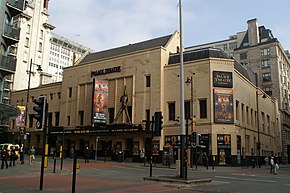.jpeg) |
| The Cast of Elysian Moments at ChromaQ Theatre, Leeds 23 Nov 2024 |
Last year was Powerhouse Ballet's best ever. We danced an extract from La Sylphide at KNT Danceworks' 15th-anniversary gala in July and contributed Emily Joy Smith Elysian Moments to Dance Studio Leeds's Celebration of Dance at ChromaQ Theatre in Leeds in November.
We have now performed nine times in public, twice at the Manchester Dancehouse, 6 times at ChromaQ and once at York St John University. We have held workshops on The Waltz of the Flowers with Jane Tucker, The Fairy Variations with Beth Meadway, Alex Hallas's Concerto Jenkins and Morning from Grieg's Peer Gynt with Yvonne Charlton, We have hosted Ballet Cymru's workshops on Dylan Thomas and Giselle. We have held company classes almost every month since we started including during the lockdown when we welcomed Maria Chugai, Shannon Lilly and Krystal Lowe as guest ballet mistresses.
Our next step is to hold our own show which will probably be a mixed bill or a complete act of one of the romantic ballets we have learned. We shall probably need to do this in conjunction with one or more partners which could be a dance studio or even another small company. That will require a lot of planning and corporate reorganization. Right now the company is a group of friends who enjoy dancing but we shall put it on a more formal basis in the course of the year. I am exploring the possibility of charitable status for the company and converting Terpsichore into a private limited company.
Up to now, the company has relied entirely on sponsorship. That source of funding will not dry up but we need to supplement it with a Friends scheme whereby we shall invite the company's members and well-wishers around the country to make a modest annual contribution. We shall also need to monetize some of our services which will include smartening the appearance of this blog, publishing a regular print version, reviving Stage Door and charging for workshops and some of our other activities.
In the longer term, we shall seek grant funding and commercial sponsorship. I have already made contact with Arts Council England and the Arts Council of Wales. While it is impractical to expect funding from that quarter in the medium term it is never too early to prepare the ground. I have also put out feelers to organizations that already fund the arts to find out what we must do to qualify for their patronage.
Dancers need to train regularly with each other which is why every company in the world holds regular company classes. However, our membership is spread over an area that stretches from Hull to Holyhead. It is very difficult for members who have demanding professional and domestic commitments to travel long distances. When I have tried to hold classes in outlying areas in venues like Bolton or Myndd Isa the response has been disappointing. Obviously, the solution is to hold regular monthly classes in Leeds and Chester as well as in Manchester but these will have to rely on non-sponsorship funding. If we get that right there is no reason why Powerhouse Ballet branded activities cannot take place anywhere in the UK or beyond and not just Manchester and Leeds.


